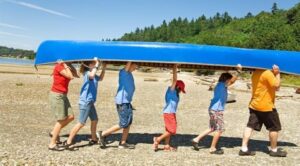The hugely successful trailer rental business founded by L.S. Shoen in 1945 now seems to illustrate all that can go wrong with a second-generation family business. What lessons can other family companies extract from the U-Haul imbroglio, which has divided Shoen and his 12 children into two warring camps?
By Howard Muson in Family Business Magazine
LAST August, Eva Berg Shoen, 44, was shot to death in the resort town of Telluride, Colorado, where she lived with her husband, Sam, and their two children. The killer entered the Shoens’ home during the night, evaded the family’s six dogs, and, apparently using a silencer, shot his victim in the back. Local authorities in Telluride said the murder could have been the work of a professional hit man.
The murder made headlines well beyond the confines of Telluride. For Sam Shoen, 46, who was in Phoenix, Arizona, at the time of the murder, is the oldest son of the founder of U-Haul Co., the nationwide, multimillion-dollar truck and trailer rental company based in Phoenix.
The immediate suspicion was that the death was somehow related to a long-running, bitter feud in the family that has pitted Sam and his 75-year-old father, L.S. Shoen, against another family faction led by two of Sam’s brothers, E.J. (Joe) Shoen, 42, and Mark Shoen, 40. Whether it was or not, the fact that some people believe it could have been attests to the extremes to which this family quarrel has gone. The investigating sheriff will say only that all possible angles in the murder are being pursued.
In 1986, Joe and Mark succeeded in lining up enough shareholder support to oust their father and take control of the privately held company he founded in 1945. Sam quit as president and CEO of Amerco, the parent company of U-Haul, in 1987, but he and his father continued to battle against Joe and Mark’s efforts to consolidate their control. The feud had lately escalated into a series of lawsuits and counter suits, stormy board meetings, and even occasional fisticuffs.
The Shoens are hardly the typical American family. They are clearly a rough, mercurial breed whose rivalries and hatreds run deep. L.S. had 12 children—his first wife died relatively young, and he married three times thereafter—and they grew up in bunches, with different mothers. Early on, they formed the alliances that would later divide the family into two warring camps.
L.S. laid the seeds of his later problems by doling out generous amounts of stock in the company to each of his children. He ended up giving them no less than 94 percent of the company, a move that he would later regret. Referring to the giveaway in a 1988 letter, he wrote: “My ignorance has resulted in much evil.”
Yet, like other business owners, L.S. Shoen had dreamed that his company would be passed on in the family and endure for generations. In some ways the Shoen feud dramatizes the perils of building a successful business and failing to provide for the future. The divisions in the House of Shoen are similar to those faced by many families with lots of kids who clash in the business—it’s large and with an abnormal undercurrent of violence.
The charges and counter-charges in hundreds of pages of affidavits are difficult to sort out. But the bare facts of this tragic history, as pieced together from various newspaper and magazine accounts, can perhaps shed some light on where this dream turned into a nightmare, and how others can avoid the same traps.
The story starts like a familiar fairy tale. A Navy officer at the end of World War II has a great idea for starting a business: Rent trailers to people moving to distant cities and let them drop off the equipment at their destination.
Known to many as Sam the Trailer Man and “Slick” the short, round-faced, fast-talking Shoen was on the road for weeks at a time, meeting dealers, servicing his equipment, often sleeping in his car. At home in Portland, his wife, Anna Mary, took care of the books and signed U-Haul checks. L.S. was on the road for such long stretches that he did not attend the births of his first three children, Sam, Mike, and Joe. Three more children followed: Mark, Mary Anna, and Paul.
By the mid-fifties, the company had taken off. L.S.’s network of dealers spread from Los Angeles to New York, and U-Haul was renting some 250,000 vehicles a year. In the mid-fifties, L.S. started spending more time at home, while earning a law degree at night. Then, in 1957, his wife, who had a congenital heart defect, died of a heart attack at the age of 35.
L.S. did not know how to care for his large, growing brood. About a year later, he married a neighbor’s 23-year-old daughter, Suzanne Gilbaugh, who was put in charge of the household. Sam and Mike were packed off to boarding school. But Suzanne had trouble coping with Joe, who was 9 years old, and Mark, then 7. When L.S. resumed his heavy travel schedule, the boys and their stepmother carried on a war of wills. Upon his return from trips, L.S. would get lists of his sons’ grievances against their stepmother. Meanwhile, as L.S. recalled, “the kids kept coming”—a boy and four girls—and in 1967 he moved the family to a Frank Lloyd Wright house outside Phoenix.
While L.S. tried to keep the peace at home, he was building his organization. The blue collar workers who had helped him start the company became top executives in U-Haul, as did some gas station attendants in his dealer network.
According to an article in M. Inc. magazine by John Tayman, the founder was already displaying some of the eccentricities that later led one group of his children to question his competence. At staff meetings, he quoted Napoleon and the works of Kahlil Gibran, and he passed out copies of letters by Abraham Lincoln. Years later, he threw $1,000 in small bills out of an office window to make a point about corporate waste.
Shoen wanted each of his kids to have a stake in the company; gifting stock to them, of course, also had tax advantages during the time when the company was growing. In 1952, he had established guardianships for the five oldest and given each about 10 percent of the company’s stock; at the stock’s peak value, each child’s holdings was worth about $70 million. Later Shoen children received lesser gifts of stock, including a son named Scott born in 1975 to a woman he visited on business trips and married for one day to legitimize the boy. L.S. also distributed some stock to about 400 employees. He was left with only 2 percent.
When his sons were older, L.S. was aware of their rivalries. He hoped to teach them something about working by turning over to them the management of a Phoenix amusement park called Legend City that he had bought in 1968. While Joe and Mark got experience working together at Legend City, Sam and Mike were in college and not much interested in the park.
L.S. knew that one of his sons would eventually run the company. The soft-spoken and articulate Sam wanted to be a doctor, the second son, Mike, a lawyer. “That left Joe, who wanted the job and expected to get it,” writes Tayman. “L.S. secretly hoped that once Sam got his medical degree he could be lured to Amerco, but L.S. never discussed this plan. Worse, he never discussed it with Joe.” Sam did come to U-Haul, after getting his medical degree and an MBA from Harvard, where he graduated near the top of his class. He arrived in 1973, the same year as Joe, who had gone to Dartmouth and then also earned a Harvard MBA. Sam was soon named head of East Coast field operations. Many in the company expected him to succeed his father as Amerco’s chairman; Joe became head of U-Haul International.
The year that Sam and Joe joined U-Haul was a turning point for the business After the first oil shock in 1973, many full-service stations in L.S.’s dealer network had to shut down, and U-Haul was forced to invest heavily in building its own freestanding rental centers.
L.S. rose to the challenge of an earnings decline with a grand diversification plan. He turned his dealerships into “garden centers” for which he bought a bizarre assortment of equipment—furnishings from the Far East, jet skis, lawn mowers, champagne fountains, folding dance floors. Many of the dealers didn’t know the first thing about marketing this kind of equipment. L.S. also overlooked another important detail: the skyrocketing cost of liability insurance.
While the Shoens were pouring money into L.S.’s garden centers, U-Haul’s fleet of trailers and trucks was aging. A powerful competitor in Miami, Ryder Systems, was offering newer, air conditioned vehicles with automatic transmissions. For the first time, U-Haul had a formidable competitor that was taking over a share of the market.
Not long after his divorce from Suzanne in 1977, L.S. fell into a depression; according to the Wall Street Journal, he had to be hospitalized in Los Angeles for two weeks. The Journal reported that he returned to find “Mike grousing about harassment from Joe, and Sam being accused of incompetence by Joe and Mark, who during staff meetings began badgering their father about his decisions.”
At that point L.S. apparently sought help. He pressured his sons into attending group counseling sessions with a psychologist and family business expert. Jerry Day, the psychologist who worked with the family, wrote in his report: “Joe and Mark have matured into adults who are quite comfortable with power and are willing to fight for it. Their desire for absolute power is insatiable.” Day’s report urged L.S. to be more decisive in dealing with his children.
The sessions did not reconcile the factions, but L.S. did make a decisive move in 1979: He rearranged titles and made Sam president and CEO of Amerco while he remained as chairman. That precipitated the resignations of Joe and Mark, who left the company and established their own printing business.
Despite the rift, L.S. gave most of Amerco’s printing work to his sons’ new venture, called Form Builders. All the while, however, Joe and Mark were trying to drum up support among their siblings and plotting to get control of Amerco. As Ryder started gaining on U-Haul, L. S.’s critics in the family accused him of stubbornly refusing to invest in modernizing the fleet. When the company’s earnings sank from $41.6 million in fiscal 1984 to $10 million in fiscal 1985, family members were alarmed. Joe and Mark finally won over their sister Katrina Carlson, a key vote. At a stockholders’ meeting, L.S. agreed to step aside as chairman if Joe and Mark would bring in a mediator to set up a new management structure.
With a mediator’s help, the two factions agreed on a structure that left Sam as president and CEO of Amerco and made Joe chairman. A four-member board included both of them and brothers Paul and Jim, who sided with Joe. L.S. resigned and was kept on a salary that amounted to a pension. At a retirement party called “’The Celebration of Love and Respect,” he gave a rambling, 30-minute farewell speech in which he told the crowd, “I do want you all to know that I trust my sons and daughters absolutely.” He later compared his ouster to the betrayal of Julius Caesar.
The honeymoon was quickly over, and the accusations began flying once again. Sam, who had backed his father’s expansion plans, reportedly started to pull back from the garden centers and to buy new trucks for the business. But he evidently wasn’t moving fast enough for Joe, who wanted to return to the company’s core business and update the fleet as quickly as possible. According to Sam, Joe frequently criticized his decisions and countermanded his orders. Sick of the tension and 12-hour board meetings, Sam quit in 1987.
The continued bickering eroded Joe and Mark’s position; Katrina changed her mind in 1988 and threw her support back to L.S. and Sam’s faction. Then there were reports that L.S. and Sam were negotiating a sale of Amerco with various investment bankers and leveraged-buyout specialists. When Joe got wind of one such negotiation, L.S.’s lawyer said, he “began screaming like a bishop cornered by Satan.” Amerco sued Sam and one of his sisters, charging that they had financially damaged the company by giving away secret information. In response, their lawyer, Walter Johnson, says that Sam’s group had merely sought advice from the investment bankers on what they should do about their Amerco investment, given the stalemate in the family.
No doubt to head off any challenge, Joe’s board voted in July 1988 to approve the issue of more than 8,000 new shares of stock, which was then sold to a group of nonfamily executives loyal to him, the so-called Golden Five. More lawsuits have followed, and Sam and L.S. have complained that their views have been suppressed at stockholders’ meetings. Then in August, Eva Shoen was murdered, and the family dispute was once against splashed all over the newspapers and TV newscasts.
Despite all this, the current Amerco leadership’s efforts to return to basics and modernize the company’s fleet seem to be getting results. Although heavily in debt and bled by the costs of litigation, Amerco began to rebound with earnings of $36.2 million in fiscal 1989 and $18.5 million in fiscal 1990 (the company blamed rising vehicle replacement costs for last year’s falloff).
L.S.’s efforts to sue to nullify the stock issue have drawn a blank in the lower courts. Although the case is on appeal to the Arizona Supreme Court, it seems that Joe and Mark are firmly in control of the company. Joe is now president and chairman of Amerco, and Mark is president of U-Haul International. They sit on an enlarged seven-member Amerco board that includes four nonfamily members.
Like an aging Lear who has given away his domains and lived to regret it, LS. spends his days writing letters to his children and preparing his legal actions. Sam’s group has offered a $250,000 reward for information leading to his wife’s murderer, but so far there have been no arrests.
If nothing else, this sad history may give other families a sense of relief. Whatever their troubles, they cannot approach the enormity of the Shoens’.
Still, some families will doubtless identify with issues in the family’s history, especially families that have several proud and ambitious siblings eager to share in the running of the company. What can a parent do to moderate the rivalries that persist into adulthood and to prepare the family for an orderly succession? Is there a right time and a wrong time to start transferring stock to your children? At what point does it make sense to consider selling the company or dividing it up to keep warring siblings apart? From the standpoint of the adult children in a business, how can they persuade an aging parent to step aside when his decisions put the company on a course for disaster? And are there ways to do it without risking a family rupture?
How the experts see it
Consultant
MIKE COHN, President, the Cohn Financial Group in Phoenix, specialists in family business transfer strategies.
In his book, Family Business, Risky Business, David Bork wrote that two values essential to the survival of the business are love and respect for other family members. In the Shoen family, the pursuit of power seems to have been a compulsion, while love and a sense of justice appear to have been in short supply.
L.S. Shoen seems to have taught his children the value of hard work and a competitive spirit, but did not model cooperative qualities that might have provided some balance in their lives.
L.S. gave away his “kingdom” through gifts of stock, but he seems to have been motivated as much by short-term tax benefits as by altruism. Often outright gifts of this sort come with strings attached. The children may feel that the parents still want things done “their way,” that the parents are avoiding the emotional pain of letting go.
Before giving away stock to his children, a business owner should consider that the gift may deprive them of the opportunity to make their own commitment to the business. The founder’s struggle and accomplishments are heroic, the bedrock of the family’s culture. The members of the next generation need to be heroes, too, in their own eyes and those of their children.
There is a better way to create pride of ownership along with value for the company: Let members of the new generation earn their ownership through performance-based stock bonuses.
Another alternative is for the children to buy the business from their parents. Often the funding for a family led leveraged buyout can come from the business’s cash flow.
Finally, the company can be divided among siblings—either along operational or geographical lines, or both in a tax-free split off. For the family torn by power struggles, the split off may create opportunities to restore family ties.
Owner
ROBERT J. SAHLBERG, President and chief executive officer of Sahlberg Equipment Inc., a third-generation distributor of construction and safety equipment in Seattle.
Succession is the most important decision a founding owner must make, and I believe that ownership as well as titles and responsibilities must be taken care of as early as possible. L.S. Shoen’s biggest mistake was giving stock to his kids before they were ready and before he understood the conflicts that could later arise in the company as a result.
Children who have no interest in working in the business should not be given voting stock, as the Shoen children were. The children who end up running the business, who work hard to ensure that it continues, will have plenty of people to answer to—bankers, suppliers, employees. They should not have to answer to family members who are not involved in daily operations.
Nothing muddies the waters more in a family business than to have non-participants – especially family members—owning voting stock in the company. With careful estate planning, the owner can gift property, cash, or other items to those family members. Another possibility would be to distribute an issue of non-voting stock to them.
As I stated earlier, the owner should establish the responsibilities of those who will manage the company before handing out titles. Ultimately, a board that includes a few Independent outsiders should define the responsibilities of the Captain, and should choose the one to hold that job.
Many family businesses, like my own, have appointed outsiders to their board. It lifts a lot of the burden—and strain—of making the tough decisions from the shoulders of family members. It seems that Amerco/U-Haul’s new seven-member board includes four nonfamily members. They can provide important balance to the company’s decisions, if they exercise independent judgment.
Psychologist
WILL McWHINNEY, Founder of Enthusion Inc. in Venice, California, which counsels family businesses.
The Shoen family failed to follow three maxims:
1. You can’t both give up power and keep it. L.S. Shoen may have had good motives in giving his sons significant chunks of the company’s stock, but he had poor family sense and/or poor tax advice. L.S. gave them the ownership but tried to keep the authority over that wealth.
2. Money corrupts those who have not earned it. Giving children large sums of money or dividend-paying stock has proved repeatedly to weaken the next generation and produce the kinds of fights that occurred in the Shoen family.
The founder who wants to keep the business in the family must make clean assignments of wealth and responsibility. This is often done by giving subdivisions of the company to different children, either directly or as a subsidiary of a holding company, and letting them make the best of it.
3. Mixing in-laws and ambiguity makes dynamite. In-laws and stepmothers are particularly anxious about the inheritance of their offspring. They lack the assured blood line to the wealth, and thus need absolute assurance of how the estate will be distributed.
Given that these three maxims were violated, what could the Shoens have done?
When L.S. finally got the family together, he should have included all the in-laws in the group consultations. If kept outside, they will usually undo all the good work that’s been done in the group sessions. This might have provided a setting for resolving most of the problems.
If the Shoens can ever get together, they should not focus on dividing a pot of money or power. Rather the family group should spend their time envisioning their futures—creating images of a desirable future, which they could enjoy. The division of property and power must be done in terms of images they share for the future.
Howard Muson is a writer, editor and consultant, and former editor and co-publisher of Family Business Magazine.
Source: Family Business Magazine, March 1991
Copyright © 1991. Family Business magazine. Subject to the provisions of the Terms and Conditions of the Family Business Web Site, subscribers to Family Business magazine may print and distribute copies of this article, electronically or otherwise, provided that (a) such printing and distribution is done only for your personal, informational, non-commercial purposes, and (b) you do not re-move or obscure the copyright notice or other notices. For other uses, including reprint permission for non-subscribers, contact Family Business magazine.








